A year ago, when Qëndron Kastrati won the mandate for the mayorship of the Municipality of Kamenica, he was only 29 years old. The triumph of Kastrati, who at the time was a member of Lëvizja Vetëvendosje [VV], was not only a moment to be remembered because of his young age, but because his victory also served to end a 17 year domination of the Democratic League of Kosovo [LDK] and the Democratic Party of Kosovo [PDK] in the municipality.
Kamenica has a majority Albanian population, but Serbs also comprise a considerable chunk of the demographic makeup at 16 percent. In his quest to become mayor, Kastrati promised to invest further to preserve ethnic harmony in the municipality, and a step to demonstrate his commitment was by appointing a Serb as deputy mayor. Still, he says that to continue this harmony the municipality needs help from the central level of government and the EU which, according to Kastrati, have only shown moral support thus far.
Kastrati says that the biggest change that happened in the first year of his mandate was the approach and accountability of civil servants, but that his main priority is ending ethnic segregation in education. His sites are set on unifying schools in Kamenica.
Furthermore, Kastrati notes that one of the greatest problems facing Kamenica is population drain, as the municipality has suffered the continuous trend of departure among its citizens.
In an interview with K2.0, Kastrati speaks about his first year as mayor, inherited issues and the budget, the coexistence between Albanians and Serbs, the challenges that lie ahead in the next three years, as well as his departure from Lëvizja Vetëvendosje and his relations with the party in the municipality.
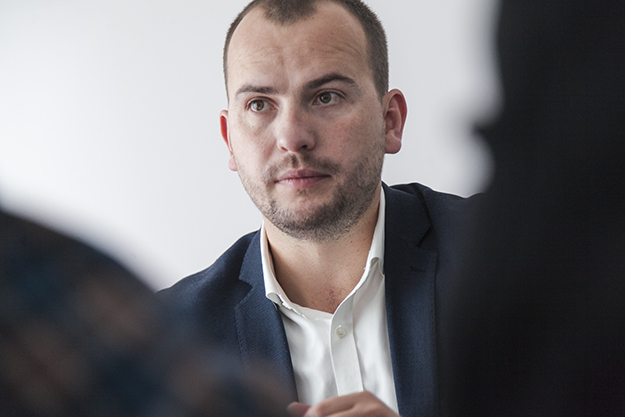
Qëndron Kastrati. Photo courtesy of the Municipality of Kamenica.
K2.0: Today (November 19) marks one year since you won the mandate for the mayorship of the municipality of Kamenica. What has changed since then?
Qëndron Kastrati: I think that we mostly changed the approach. I think we were the first to seek accountability from employees for their work or lack thereof in the Municipality of Kamenica. In this first year, I was a bit more strict regarding inactivity and irresponsibility [than previous leadership]. There were many rebukes issued to officials who did not fulfill their duties. But now, I think that they will also understand better that I honestly do not tolerate in this regard, and that they need to fulfill their duties.
Which are the most evident issues that you have inherited?
The most notable issue is the budget. The Municipality of Kamenica is in a bad situation in regards to the budget for capital investments. The problem is that the budget is divided poorly based on the number of residents, and over 89 percent of the formula which determines the allocation of the budget is dominated by the number of residents; as a municipality, we have lot of territory, but a low number of residents. For example, our surface area is about 80 percent of Prishtina’s, whereas our population is only equivalent to 15 percent of Prishtina’s. Even Fushë Kosova has more residents and a bigger budget, but we are four times bigger [in territory] than Fushë Kosova.
However, in investments — for example in infrastructure — the cost is the same, no matter where you are, in Prishtina, in Fushë Kosovë or in Kamenicë. Most of the budget is spent on additional wages for teachers and in education. So we have one third of our schools, or 13 schools, with less than 25 pupils and around 1 million and 600,000euros – which should have been spent on capital investments – are [now] spent on wages to support education. This is a big issue, because approximately 80 percent of the budget is spent on wages and salaries of officials.
What do you do with the remaining 20 percent?
Not even 20 percent, because 10 percent goes to operational expenses — spending for facilities, energy etc. — so only 10 percent remains for capital investments. However, last year there were 124,000 euros in capital investments, and this year there will be around 900,000 euros. We are trying to spend 50 percent of our time and energy on attracting donations and funds.
Let’s elaborate on the issue of education, which you’ve — during and after the campaign — mentioned as the top priority. What concrete changes have been achieved in education in Kamenica and how has the practice of appointing headmasters of schools been implemented?
In truth, most headmasters have mandates that go further than mine. So in the period when I was elected, but was yet sworn in, most headmasters had their mandates extended, and they too have four year mandates. There are two open spots and we are trying to manage [the job call] with a team of experts who are not employees of the municipality but are engaged externally, and who will interview and evaluate candidates. We are also looking into the aspect of transparency, because we want to be as transparent as possible. In fact, if it’s possible, we want to go a bit further than [the municipality of] Prishtina in this aspect.
What do you mean further than Prishtina Municipality?
For example, one of the ideas is to publish the interviews online so that people have access to them. But this creates an issue where the interviewed candidates must agree to be filmed, or we’ll need to see whether their emotional state changes before camera. But, we are looking into it.
But concretely, what have you undertaken since you took office?
We’ve mainly prevented misuse. For example, schools in the Municipality of Kamenica are supplied with wood for fire, so we’ve established two commissions who go and evaluate schools [and their needs]. We’ve honestly had cases in the past where the amount of wood ordered by a school didn’t cover all of the space in its warehouse, whereas this year, when we made the order, the proper amount was delivered – the warehouse couldn’t even fit that amount.
In the past there were no public job calls or written evaluations in education. Moreover, in schools that have fewer pupils, classes were held irregularly. There were cases when I would visit unannounced and I would find the school closed. There were cases when heating was used only in the teachers’ lounge and the headmaster’s office, and not in classrooms. They would justify this by saying that only stoves are functional, but then why should the headmaster and teachers use these stoves, and not the pupils? I am very interested in making a bold decision in this aspect — to reduce the number of schools and potentially the number of teachers too.
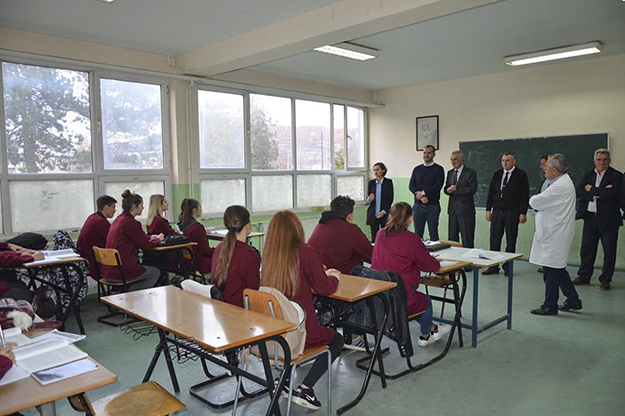
Throughout his campaign and his first year in mandate, Kastrati has promised to prioritize education. Photo courtesy of the Municipality of Kamenica.
Since you mentioned the reduction of the number of schools, would this then create a distance problem for pupils that are currently enrolled in smaller schools?
It won’t be a problem if we regulate transportation.The biggest issue is that even if we suggest to reduce the number of teachers by 100 or 200, these people will be left without income, and Kamenica is very affected by unemployment — 2/3 of the population are unemployed. Will they leave Kamenica after this? Will they take their children with them? This is an issue.
Since the end of the war, the number of teachers has been about the same; on the other hand, the number of pupils in 2006-07 was 8,200, and now there are less than 4,400 pupils. So the number of pupils has decreased by 47 percent.
Let’s talk a bit more about the issue of education. One of the issues that has incited a lot of debate in your municipality is the dismissal of the Director of Education, Ismete Thaçi. What happened? Why was Thaçi, who is a member of Vetëvendosje, dismissed from her position as director?
Frankly, in her mandate, Thaçi did not meet our expectations and I was convinced that it was no longer possible to continue with reform. Personally, I was under the impression that the former director is a bit sensitive, and this hampered her sense of judgement over the common good, the good of pupils in relation to teachers.
For me it is important that I hold the director responsible for the functioning of the directorate. I asked her to resign. She said “I am not like that, VV.”. I said on the contrary, the issue is not that you are a part of VV, rather it has to do with the way you are functioning, and we agreed that she would resign. Meanwhile, after speaking to certain members of her party in the center, she tried to utilize the public aspect to benefit her subject.
You say that she had a soft and sensitive character. Did this make her unreliable in her work?
I am not saying that. I’m only saying that she created problems in relation to general reforms and to the creation of better relations with pupils.
She says that orders for her dismissal came from above, and in a letter you sent to her you said that she doesn’t properly recognize the local issues in Kamenica’s education sector. Why was a person who doesn’t understand the issues of education appointed in the directorate of education in the first place?
No, this is the dilemma even for the next director. I personally think that if you’ve worked for years in education and are a teacher, different groups are formed and you can be subjective in decision-making. Being a bit more objective is challenging.
"To advance more in the aspect of coexistence, we feel that it is very important to unify schools; instead of having them be divided based on ethnicity, let’s divide them based on education fields and study levels."
Regarding the reforms which I aim to implement, from the start I thought that it’s better to have someone who is very able in the aspect of management and reform, and does not come from within the education sector. This is a small municipality and it is very difficult for a teacher to be prepared to make difficult decisions, for example, for colleagues with whom they have worked for years.
Let’s move to another issue for which you were highly affirmed in foreign media: the coexistence of Albanians and Serbs. You’ve sent a request for financial aid to the EU Office in Kosovo. What are your concrete objectives and have you obtained aid from the EU Office?
Kamenica is — not only in Kosovo, but also in the region — a model for coexistence between different communities. To be frank, more work needs to be done with the Roma community, but Serb and Albanian communities are at a better level.
As for the Roma community, I am talking about the aspect of their economic situation and especially university education. I really wanted to have a member from the Roma community in my cabinet. We were engaged in the field, looking to find a suitable candidate, but almost none of them had finished college, and I found that the main reasons for this was financial. But this does not mean that the good coexistence will continue only in its current form.
Older generations know one another’s languages and have started to communicate. We have a common market. Shops of Albanians are frequented by Serbs and Roma, and vice versa. However, if we limit it to this, I am under the impression that we will only damage the aspect of coexistence, because now the younger generations who are currently being educated are in completely divided systems, so we need to create environments for the youth in which they can cooperate and communicate with one another.
Now they function with an education curriculum that is only in Serbian, as we do with an exclusively Albanian curriculum. To advance more in the aspect of coexistence, we feel that it is very important to unify schools; instead of having them be divided based on ethnicity, let’s divide them based on education fields and study levels.
As a municipality, we cannot change the curriculum, but we can attempt to encourage them to hold certain classes of certain fields together – for example, physical education or information technology. So it is a way for them to communicate. Naturally, I know this is a challenge for subjects which we see from different perspectives. But it is very important to encourage children in schools to start communicating with one another.
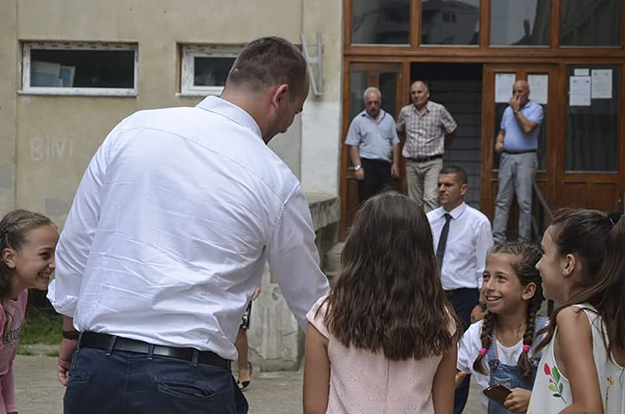
Kastrati aims to unify pupils of different communities in subjects such as physical education. Photo courtesy of the Municipality of Kamenica.
Have you taken any concrete action?
We made a request to the EU, and I am surprised that until now they’ve only responded by saying “Yes, we are interested to continue further in this aspect.” They just told us that it is a good idea. I am a bit critical of the EU and other organizations in Kosovo which only orient projects and funds in places of crisis and conflict, rather than trying to promote good cases and examples such as Kamenica. I think this would even do good for the places which face issues.
You mentioned another issue, that younger generations do not know each other’s languages. Do you speak the Serbian language?
No, I don’t. I was born in 1988. I started my education in the exclusively Albanian parallel system before the war, and continued with Kosovo’s curriculum after the war.
So you aim to achieve the objective of learning languages through cooperation in schools?
Yes, that is correct. We are discussing a model similar to Ireland’s. Since they have different religions there, through schools, they’ve managed to provide more harmony and cooperation to pupils and teachers. In the next month, I will go to visit Ireland because we are interested to twin with one of their schools.
Another current issue in Kamenica is the departure of citizens from the municipality. You’ve also highlighted this issue as a serious concern. Is there anything being done to prevent this phenomenon?
Yes, it’s true. But firstly we must make it clear that the local level in Kosovo does not have many competences in the aspect of economic development. There are some opportunities, such as allowing the use of municipality properties at convenient prices. But we are engaging more, with the Albanian diaspora in particular. We are trying to find a solution for them to invest and we’re trying to identify what they consider to be issues. For example, one of the main issues for investment is corruption and the perception that it exists in Kosovo. Investors only need to read Transparency International’s report to see where Kosovo is ranked.
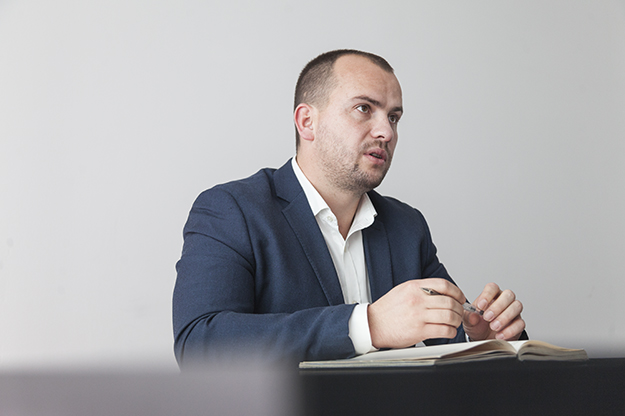
Qëndron Kastrati. Photo courtesy of the Municipality of Kamenica.
Another issue is bureaucracy. We have extreme bureaucracy. The third issue is the impression that has been created that the level of the education system in Kosovo does not compare to the European market, and that we are not devoted and disciplined workers.
All the time we are trying to tell the diaspora that if the schedule of citizens is respected, and if they are paid wages that enable them to live with dignity, they will never have a problem [with investments]. We have businesses in Kamenica which never have issues with employees, and have had the same employees for decades. But when people are asked to work for 12 hours, six days a week, naturally they won’t cope.
However, there are also a few other issues which we are analyzing to see what advantages Kamenica has. We are bordered with Bujanoc, and very close to the Greece-Macedonia-Serbia corridor which leads to the European market. Now, together with the Municipality of Ranilug, we are looking into opportunities to make a common economic zone, which would aim to benefit businesses who are interested in producing especially for the European market. We know that in 2016 Kosovo signed the Stabilization Association Agreement [SAA], so we must try to utilize the opportunities that SAA brings.
Let’s elaborate on the issue of supporting businesses. Recently you’ve started to supply pupils of the lower cycle in schools in Kamenica with bagels and milk. Which company is supplying them? Is the company from the Municipality of Kamenica or has an external company been contracted?
To be frank, I don’t know the name of the company… Four municipalities in Kosovo have tried to implement this policy and, until now, only Prishtina and Kamenica have been successful. The reason is that we have a dairy products manufacturer that has outstanding production capacity. Mitrovica and Ferizaj tried to supply schools from local bakeries, but they didn’t manage. It [requires] big machinery, a big investment, and unfortunately in Kamenica we don’t have a bakery that could manage the capacity of producing that amount of bagels within the day.
So we started with the same company that was used in Prishtina. But in the future, we will try to encourage our bakeries to get together and see what products they produce.
But let’s make one thing clear: procurement in Kosovo doesn’t allow you to give an advantage to local bakeries, rather,Kosovo is seen as a whole. Moreover, prices also regulate the issue of who wins the right to sell these products.
Opposition parties have reacted to your decision to appoint Bojan Stamenković as deputy mayor of the municipality. LDK and the New Kosovo Alliance [AKR] said that he is a member of the Lista Srpska (Serb List) and that he works under their agenda, but Stamenković has denied this. Can you tell us more about who Bojan Stamenković is?
Yes, he denied that he is a part of the Lista Srpska. Now, I don’t know what to do with them. Someone says “I am not with them,” and they say “no, you are, you are,” [laughs]. I was very interested because since I myself don’t know the Serbian language and since I’ve lived most of my life in Prishtina, I found it hard to approach the Serb community, so I looked for someone who can best approach them.
Bojan is not a member of any party and that was my request, because I wanted the deputy mayor to be from the Serb community and to not have affiliations to any parties. I supposed that if the person was to be affiliated with a party, only their voters would cooperate with them. I wanted someone who represents the Serb community as a whole, someone who would include members of the Roma community, who have been educated only in Serb schools. That is the truth.
Bojan has experience from after the war, having worked in Kosovo institutions, in Kosovo Customs, and knowing the Albanian language very well, knowing the English language quite well. He is also an extraordinary worker, and has a great approach towards citizens, and manages to include them a lot.
Moving on to a question, which is hard to evade. You didn’t break the silence regarding your departure from VV. I’ll try to get you to do so, but this time let’s localize the issue. What are relations like between VV and the Social Democratic Party [PSD] in the Municipality of Kamenica?
Depends who you’re talking to. For example, the head of [branch of] VV in Kamenica has tried to utilize the municipality to make promises for jobs. The biggest issue has been in the education sector. We’ve had cases in which pupils did not fulfill the criteria to be accepted in the gymnasium and he promised them that they would be accepted. One pupil went to school for two months and then was dismissed by the Director of Education. Naturally, the child’s parents came and said “What do we do? We want our child to go to the gymnasium because he promised us.”
"We have businesses in Kamenica which never have issues with employees, and have had the same employees for decades. But when people are asked to work for 12 hours, six days a week, naturally they won’t cope."
He also promised jobs to others. I will reiterate: the moment you become a director, you mustn’t utilize your position or power to benefit the party. I do not see any of the directors or officials that hold positions as being under the auspices of the subject, and I assure them that they will be dismissed if I found out about any kind of misuse of position on their part.
But there is another part,older activists of VV, with which I have outstandingly good relations. There are currently four directorates which are led by VV members and with which I have outstandingly good relations.
The PSD-VV relations have had a big influence on the Municipal Assembly of Prishtina. For example, when PSD needed VV’s votes for decisions in the Assembly, the latter was very oppositional towards PSD’s proposals. But Kamenica has less media attention, and the public is less informed. Is the same happening there?
It has not happened until now. Now, after the Head of the Municipal Assembly [Bajram Mavriqi] was dismissed, we will see how the situation develops [Mavriqi was dismissed in October 2018 through a vote of no confidence initiated by PSD, AAK, AKR and Nisma]. But I think it is different because of the lack of public and media attention. There is a lot of attention on the Municipal Assembly of Prishtina, whereas there is less attention for smaller municipalities, which means they don’t try to use their seats in the Assembly for show. But I am under the impression that there are differences between individuals and how they see certain issues.
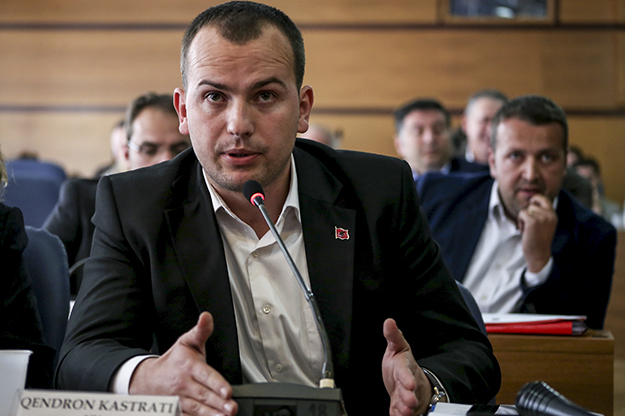
Kastrati is one of the former members of Lëvizja Vetëvendosje who joined Partia Social Democrat in May 2018.
Do you feel that your victory would have been possible without the support of VV?
No, I’ve said it before that without a party such as VV, my victory would have been impossible. It is very important to have structures in the field who help you to achieve victory. But it is more important to manage to understand that this is a combination [between the candidate and the subject] because VV had candidates in all municipalities in Kosovo that have Albanian majorities and they only managed to win in three of them. More specifically, in the Municipal Assembly of Kamenica, VV comes second with its number of assembly members after LDK.
We cannot ignore the evaluation of citizens. For them, the subject is important, but so is the individual and the program which they present. Moreover, it is offensive to citizens if you say that Qëndron Kastrati won only in the name of VV, because thankfully in Kosovo we have open lists and in addition to voting for subjects, citizens also vote for individuals.
Do you believe that you will continue your mandate now that you are not a part of VV?
I believe we have the opportunity to win another mandate, but the issue is that I have not decided on this. It depends on the development of the projects, which we are currently working on. But if I give what I have to give in these four years, why should I continue for another mandate. So I have to think about this issue. However, seeing how we are working, I’m convinced we will win.
Nevertheless, I would really like to see a woman as Mayor of Kamenica in the next mandate.K






